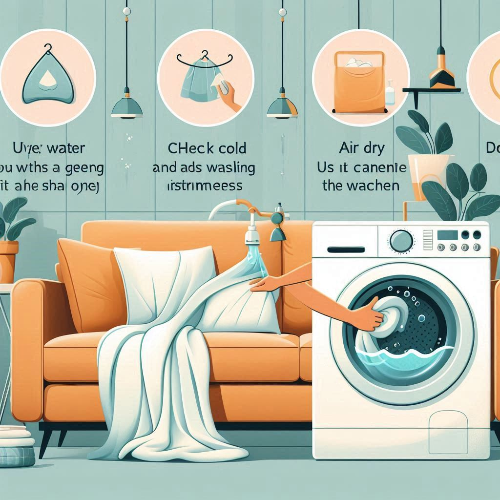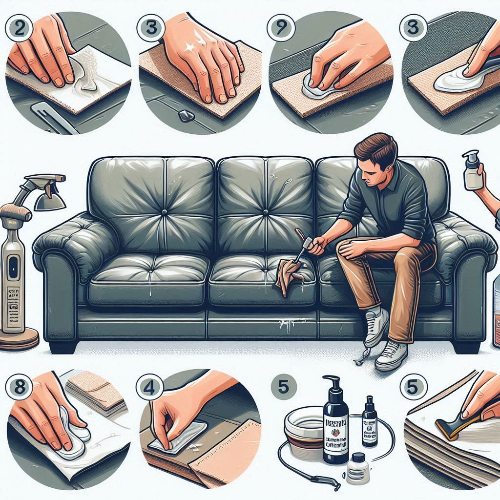How to Wash Sofa Covers Without Shrinking: A Complete Guide
Maintaining the cleanliness and appearance of your sofa covers is essential for a welcoming living space. However, washing sofa covers can sometimes lead to shrinkage, which can compromise the fit and aesthetic of your beloved upholstery. In this comprehensive guide, we will explore various methods for washing sofa covers without shrinking, ensuring your covers remain in excellent condition while effectively removing stains and odors.
What is the Best Way to Wash Sofa Covers Without Shrinking?
Understanding Fabric Types for Sofa Covers
To effectively wash your sofa covers without shrinking, it is crucial to understand the different fabric types they can be made of. Common materials include cotton, polyester, linen, and blends of these fabrics. Each material has its own unique properties and washing requirements. For instance, cotton is known for its durability but can shrink if washed in hot water or dried at high temperatures. On the other hand, synthetic fabrics like polyester are less prone to shrinkage but may require specific washing instructions to prevent damage. Always check the care label on your sofa covers to identify the fabric type and follow the recommended washing instructions closely to avoid any unwanted shrinkage.
Choosing the Right Washing Method
There are two primary methods for washing sofa covers: machine wash and hand washing. While many covers are designed to be machine washed, opting for hand washing may be a safer choice for delicate fabrics. When machine washing, ensure that the covers are loaded properly in the washing machine to allow for adequate movement during the washing process. For hand washing, immerse the covers in a basin of lukewarm water with a gentle detergent, gently agitating the fabric without scrubbing too hard. This method can help prevent any potential shrinkage and preserve the integrity of the fabric.
Tips for Preventing Shrinkage
To wash sofa covers without shrinking, there are several tips you can follow. First, always use cold water when washing, as hot water can cause fabrics to shrink. Additionally, avoid using high heat settings in the dryer; instead, opt for low heat or air drying. If you choose to air dry, hang the covers in a well-ventilated area away from direct sunlight to prevent fading. Lastly, consider washing your sofa covers separately from other laundry, as zippers and buttons from other items can snag the fabric, leading to damage that may affect the fit and appearance of your covers.
Can I Use a Washing Machine to Wash My Sofa Covers?
How to Properly Load Sofa Covers in the Washing Machine
Using a washing machine to clean your sofa covers can be efficient, but proper loading is essential to avoid shrinkage and damage the fabric. Start by removing any loose debris or crumbs from the covers. Next, check the care label for any specific instructions regarding machine wash settings. When placing the covers in the washing machine, avoid overcrowding the drum; this allows the covers to move freely and be thoroughly cleaned. If your sofa covers are particularly large or heavy, consider washing them one at a time to ensure that they are cleaned effectively without stretching or shrinking.
What Settings Should I Use on My Washing Machine?
When machine washing your sofa covers, select the appropriate settings to minimize the risk of shrinkage. Typically, you should choose a gentle cycle with cold water. This setting helps preserve the color and texture of the fabric while also reducing the chances of the covers shrinking. If your washing machine has a delicate cycle option, it is advisable to use that for better results. Always remember to double-check the settings based on the fabric type; some fabrics may require a specific washing process to avoid any damage.
Detergents: Which Ones are Safe for Sofa Covers?
Choosing the right detergent is crucial for maintaining the quality of your sofa covers. Look for gentle, fabric-specific detergents free from harsh chemicals that could damage the fabric. Avoid using bleach or fabric softeners, as these can lead to discoloration and potentially weaken the fibers of the fabric. For natural options, consider using a mild liquid soap or a detergent that is specifically formulated for delicate fabrics. Always perform a patch test on a small, inconspicuous area of the cover before washing it entirely to ensure that the detergent does not cause any adverse reactions.
How to Wash Couch Cushion Covers Without Causing Damage?
Identifying the Material of Your Couch Cushion Covers
Before washing couch cushion covers, it is important to identify the material they are made from. Cushion covers can be made from materials similar to sofa covers, such as cotton, polyester, or even leather. Each material dictates the best washing method. For example, leather cushion covers may require professional cleaning rather than a traditional wash. Always consult the care label to determine the proper washing instructions and avoid any procedures that could lead to shrinkage or damage.
Step-by-Step Guide to Washing Cushion Covers
To wash your couch cushion covers effectively, follow these simple steps: First, remove the cushion covers from the cushions and check for any stains that need to be treated. Next, pre-treat any stains with a suitable stain remover, allowing it to sit for a few minutes. After pre-treating, you can either hand wash the cushion covers in lukewarm water or place them in the washing machine on a gentle cycle. Always remember to use cold water and a mild detergent. Once washed, inspect the covers for any remaining stains before proceeding to dry them.
Drying Options: Air Drying vs. Using a Dryer
After washing your couch cushion covers, you have two main drying options: air drying or using a dryer. Air drying is the preferred method to prevent shrinkage, as it allows the fabric to dry naturally without the risk of high heat. Simply hang the covers on a clothesline or lay them flat on a clean surface. If you choose to use a dryer, set it to a low heat setting and remove the covers while they are still slightly damp to finish air drying. This technique helps to maintain the shape of the covers and prevents shrinkage.
What Should I Avoid When Washing Sofa Covers?
Common Mistakes That Lead to Shrinkage
Several common mistakes can lead to shrinkage when washing sofa covers. One of the most significant errors is using hot water, which can cause fabrics to contract. Additionally, overloading the washing machine can prevent even cleaning and may stretch the fabric. Another mistake is failing to read the care label, which can provide essential instructions specific to the fabric type. Always take the time to read the care label and follow the recommended washing instructions to avoid shrinkage and preserve your sofa covers.
Why You Should Never Wash Certain Sofa Covers
Some sofa covers are not suitable for machine washing at all, particularly those made from delicate materials like silk or those with intricate embellishments. Washing these types of covers can lead to irreversible damage. Instead, consider alternative cleaning methods such as dry cleaning, which is a safer option for preserving the quality and appearance of these delicate fabrics. Always check the care label to determine the recommended cleaning method, and when in doubt, consult a professional cleaner.
How to Read the Care Label on Your Sofa Covers
Reading the care label on your sofa covers is essential for understanding how to wash them properly. The care label typically provides information on the fabric type, washing instructions, and any specific warnings against certain cleaning methods. Look for symbols indicating whether the cover can be machine washed or if it requires hand washing or dry cleaning. Additionally, pay attention to temperature settings and drying instructions. By following the care label closely, you can prevent shrinkage and ensure that your sofa covers remain in pristine condition for years to come.
How to Remove Stains from Sofa Covers Before Washing?
Best Stain Removal Techniques for Different Fabrics
Before washing your sofa covers, it is crucial to address any stains effectively. The stain removal technique will depend on the fabric type. For cotton and polyester blends, gently blot the stain with a clean cloth and use a mild detergent to treat the area. For upholstery made of more delicate materials, such as silk or velvet, use a specialized stain remover that is safe for those fabrics. Always test the stain removal solution on a small, inconspicuous area first to ensure it does not cause damage.
Using Natural Ingredients for Stain Treatment
For those who prefer natural remedies, several ingredients can effectively treat stains on sofa covers. Baking soda is a great option for absorbing odors and lifting stains, while white vinegar can help break down tough stains when mixed with water. Lemon juice is another natural stain remover that works well on organic stains. Apply these mixtures to the stained area, allowing them to sit for several minutes before blotting with a clean cloth. Natural stain treatments can be a safe alternative to chemical cleaners, preserving the integrity of your sofa covers.
When to Seek Professional Cleaning Services
If the stains on your sofa covers are particularly stubborn or if the fabric is delicate, it may be best to seek professional cleaning services. Professionals have access to specialized equipment and cleaning solutions that can effectively remove tough stains without causing damage. Additionally, if your sofa covers are heavily soiled or have not been cleaned in a long time, professional cleaning can rejuvenate them and restore their original appearance. Remember, investing in professional cleaning can extend the lifespan of your sofa covers and keep your living space looking fresh and inviting.
Frequently Asked Questions
Q: How can I wash my sofa without damaging the fabric?
A: To clean your sofa covers without damaging the fabric, always check the care label first. Follow the manufacturer’s instructions for washing, and if the fabric is machine washable, use a gentle cycle with cold water.
Q: Can I machine wash my sofa cushion covers?
A: Yes, if the sofa cushion covers are labeled as machine washable, you can wash them in the washing machine. Make sure to use a gentle cycle and cold water to avoid shrinking during washing.
Q: What should I do to avoid shrinking when I wash the sofa covers?
A: To avoid shrinking when you wash your sofa covers, use cold water and a gentle cycle. Additionally, skip the tumble dry setting and air dry them instead to keep them from shrinking.
Q: Are cotton sofa covers safe to machine wash?
A: Most cotton sofa covers are machine washable. However, you should always check the fabric care instructions to ensure they can be washed without damaging the fabric.
Q: How do I clean leather sofa covers?
A: To clean leather sofa covers, avoid machine washing. Instead, use a damp cloth with a mild soap solution to wipe the surface. Regularly conditioning the leather can help maintain its appearance and durability.
Q: What if my sofa covers are prone to shrinking?
A: If your sofa covers are prone to shrinking, consider hand washing them in cold water or using a delicate cycle in the washing machine. Always air dry them to prevent further shrinkage.
Q: How often should I wash my sofa covers?
A: It’s generally advisable to wash your sofa covers every few months or as needed, depending on usage and exposure to dirt. Regular cleaning helps keep the sofa covers looking fresh and clean.
Q: Can I dry clean my sofa cushion covers?
A: Yes, if the care label suggests dry cleaning, you can take your sofa cushion covers to a professional cleaner. Dry cleaning can be a safe option for fabrics that cannot be washed in a machine.
Q: What types of fabrics cannot be washed in the washing machine?
A: Fabrics such as silk, certain types of wool, and some synthetic blends may not be suitable for machine washing. Always refer to the care label for specific instructions on how to wash the sofa covers.
Q: How do I keep my sofa covers looking new?
A: To keep your sofa covers looking new, regularly vacuum them to remove dust and debris. Wash them according to the care label, avoid direct sunlight exposure, and consider using fabric protectants to maintain their appearance.









